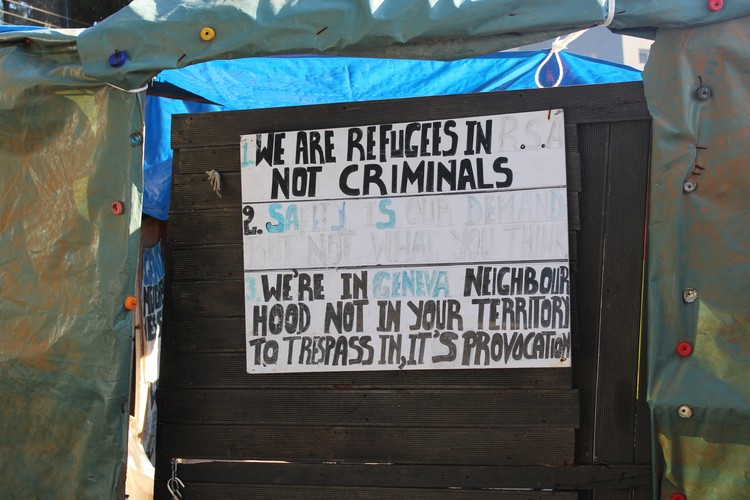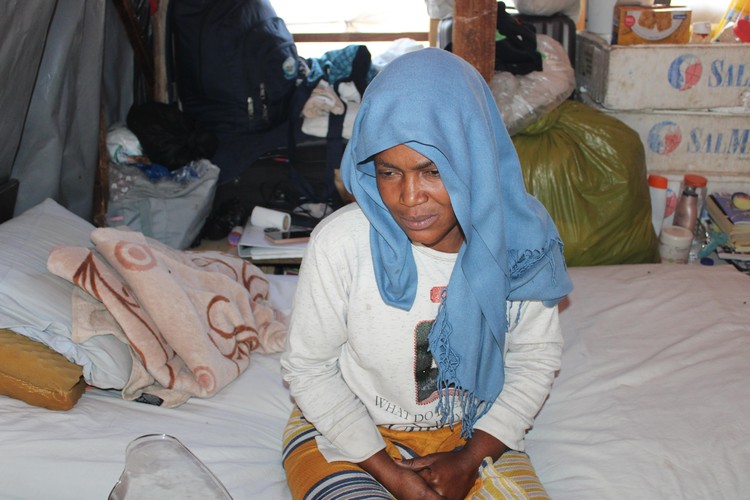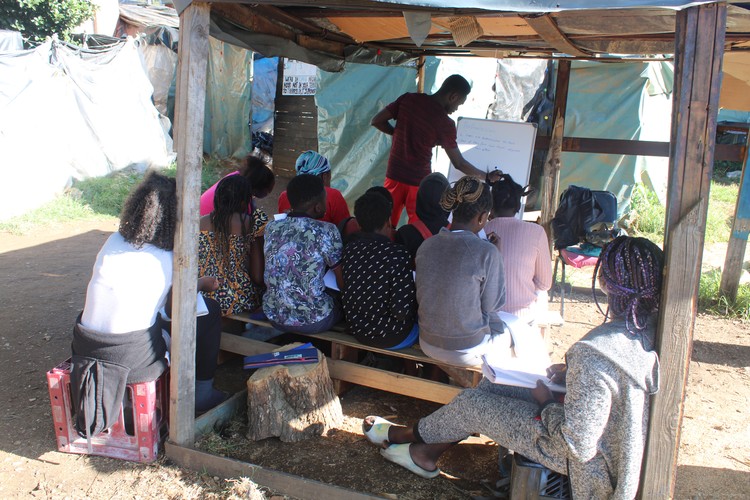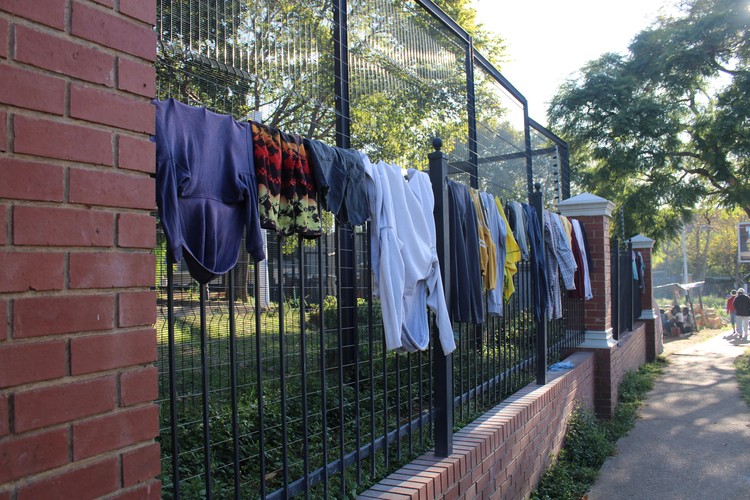Families camped outside UNHCR offices in Pretoria face eviction
Deadlock with police as refugees refuse to leave
Refugees are to be evicted from their camp outside the offices of the UN High Commisssioner for Refugees. Photos: Kimberly Mutandiro
- Refugees camped outside the offices of the United Nations High Commissioner for Refugees (UNHCR) in Pretoria are to be evicted.
- The UNHCR says the eviction, set for 19 April, has been postponed but is “inevitable”.
- The refugees say they do not want to return to their homes in South Africa or to their countries of origin: they want to be sent to a third country.
- But the UNHCR says this is not possible.
The situation was tense outside the offices of the United Nations High Commissioner for Refugees (UNHCR) on Wednesday afternoon as police prepared to evict families who have been living there.
The refugees refuse to return to their country of origin and they do not want to live in South Africa.
About a year ago some 33 families returned to the UNHCR from Lindela Repatriation Centre, where the women were taken, and Kgosi Mampuru Correctional Centre, where the men were taken, after their protests in 2019.
An eviction order was granted by the Pretoria High Court in August 2022 and will soon be implemented, according to UNHCR spokesperson Laura Padoan. Following the court order the date had been set for 19 April but the eviction has been postponed, she told GroundUp.
Padoan said she did not know the date but the eviction was “inevitable”.
The refugees have refused legal representation and the eviction order remains unopposed.
The application for the eviction order was brought by the City of Tshwane and some Pretoria homeowners against the refugees, the departments of Home Affairs, Police, and Social Development, and the UNHCR.
On Wednesday afternoon police were trying to persuade the refugees to get into vehicles to transport them to Lindela. But the refugees were refusing.
Since their return, they have been living in makeshift shelters made of plastic and wood, cooking and hanging clothes on the UNHCR fence. Some go to the robots to ask for handouts. Sometimes well wishers give them donations.
About ten children aged from ten to 15 have been getting maths lessons. Every day the chilldren have been sitting on crates and wooden benches in a shelter from 2:45pm until early evening, listening to 27-year-old Angelo Lidi, who is one of the refugees. Lidi says he decided to use the time to equip the children with maths skills. The children have not been in school since their families started the protest in 2019.
“Maths is a basic skill which the children can use no matter where they go in the world,” said Lidi.
Therisa Walu says conditions in the camp are unpleasant but she feels safe.
Therisa Walu, a mother of five, originally from Congo, says life is becoming increasingly difficult for her family. She says when her family moved to South Africa in 2007, they thought it was paradise but later discovered that it was otherwise.
She claims that her husband was killed during xenophobic attacks in Johannesburg where they were living in 2019. At the end of that year she came to the UNHCR to join the others in the protest.
The family’s asylum documents expired a long time ago and Home Affairs has failed to renew them.
She says UNHCR officials ignore them and have offered no solutions.
“Going back into the community is out of the question. There is no future here for us and our children because the country does not accept us. If it’s not Home Affairs, it’s xenophobia. My daughters wanted to go to university, one to study law and the other teaching. But they have failed to register because they still have no papers. We continue to hear stories of people being arrested because of expired papers. Shops continue to get looted. What’s the point of going back to the community because xenophobia recurs over and over again? We are tired,” Walu said.
Though conditions in the plastic shelters outside the UNHCR are unpleasant, she says, she feels safe.
“What we are asking is simple. We want to be taken out of this country because things are not working.”
Angelo Lidi has been teaching maths to children of the families camped outside the United Nations High Commissioner for Refugees office in Pretoria.
According to Maliya Mungu, the refugee spokesperson, hardly any of the refugees have valid documents and they have been struggling to access healthcare. A well-wisher who lives close by has been spending time with the refugees and sometimes buys food and medicine for them.
Mungu says he has lost touch with his wife and children since they were separated in 2020. When he returned to the UNHCR last year, he was surprised that they were not with the others. They have not communicated with him since.
“The last time we were in court, the judge asked us what we wanted. We told him that we want to be safe and live in peace, which is not what we are getting in this country,” he said.
Padoan said conditions outside UNHCR are unsanitary and dangerous, particularly for the children in the group. The refugees would be given the option to leave voluntarily before any police action, she said, and temporary accommodation would be provided at the Lindela repatriation centre.
“We are in continuous dialogue with the authorities involved including: the City of Tshwane, the Department of Home Affairs, the Department of Social Development, the police and Lawyers for Human Rights to voice our concern that any removal action is carried out peacefully and that families are treated humanely, with dignity and respect.” Padoan said the UNHCR faced limitations but that it was trying its best and would continue advocating for more resources and resettlement places for refugees who need them.
Padoan encouraged the refugees to return to the places where they had been living in South Africa.
Washing hangs on the fence of the UNHCR offices in Pretoria.
Support independent journalism
Donate using Payfast

Don't miss out on the latest news
We respect your privacy, and promise we won't spam you.
Next: Bid to resolve crisis in KwaZulu-Natal special schools
Previous: Last-minute delay to court hearing on eviction of homeless people on Cape Town’s streets
© 2023 GroundUp. This article is licensed under a Creative Commons Attribution-NoDerivatives 4.0 International License.
You may republish this article, so long as you credit the authors and GroundUp, and do not change the text. Please include a link back to the original article.
We put an invisible pixel in the article so that we can count traffic to republishers. All analytics tools are solely on our servers. We do not give our logs to any third party. Logs are deleted after two weeks. We do not use any IP address identifying information except to count regional traffic. We are solely interested in counting hits, not tracking users. If you republish, please do not delete the invisible pixel.




